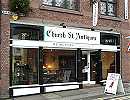Contact Seller
Church Street Antiques
Tel0161 929 5196Please quote Antiques Atlas.


 Pair Barbedienne Bronze and Ormolu Candelabra
Pair Barbedienne Bronze and Ormolu Candelabra
 Pair of Antique Quality Silver Plated Candelabras
Pair of Antique Quality Silver Plated Candelabras
 Pair of Circular Based Candelabra in Sheffield Pla
Pair of Circular Based Candelabra in Sheffield Pla
 Pair Regency Egyptian Revival Bronze Candelabra
Pair Regency Egyptian Revival Bronze Candelabra
 Pair of gilded and carved wooden torch holders.18C
Pair of gilded and carved wooden torch holders.18C
 Italian silver-plated bronze candelabra. 18th C.
Italian silver-plated bronze candelabra. 18th C.
 Pair of Charles X flambeaux, early 19th century.
Pair of Charles X flambeaux, early 19th century.
 Gilt Bronze Seven Light Candelabras
Gilt Bronze Seven Light Candelabras
 Good 19th Century Gilt-Metal Twin Light Candelabra
Good 19th Century Gilt-Metal Twin Light Candelabra
 Pr.1830 Old Sheffield Plate Convertible Candelabra
Pr.1830 Old Sheffield Plate Convertible Candelabra
 Pair of Charles X bronze candelabra. 19th century.
Pair of Charles X bronze candelabra. 19th century.
 Pair Victorian Converted Cherub Candelabra Lamps
Pair Victorian Converted Cherub Candelabra Lamps
Non UK callers :
+44 161 929 5196
Pair of Bronze and Gilt Candelabra c1820


Pair of Bronze and Gilt Candelabra c1820 with a rearing stallion fighting a snake the serpent with its tail coiled around an oak tree - 12"w x 4.5"d x 12"h -
Early 19th century pair of bronze and gilt candlesticks.
Rare pair of bronze and gilt-bronze candelabra, each with a rearing stallion fighting a snake, both realistically portrayed, the serpent with its tail coiled around the patinated bronze oak tree. The boughs of the tree form the two branches supporting acorn-cast candle nozzles and raised on the original statuary marble bases.
The subject may be intended to show the power of the monarchy (the horse) being threatened by the government (the serpent) as it prepared to widen the franchise by passing the Great Reform Act of 1832.
The Representation of the People Act 1832 (also known as the Reform Act 1832, Great Reform Act or First Reform Act) was an Act of Parliament of the United Kingdom that introduced major changes to the electoral system of England and Wales. It abolished tiny districts, gave representation to cities, gave the vote to small landowners, tenant farmers, shopkeepers, householders who paid a yearly rental of £10 or more, and some lodgers. Only qualifying men were able to vote the Act introduced the first explicit statutory bar to women voting by defining a voter as a male person.
It was designed to correct abuses – to 'take effectual Measures for correcting diverse Abuses that have long prevailed in the Choice of Members to serve in the Commons House of Parliament'.
Elections in Britain were neither fair nor representative. In order to vote, a person had to own property or pay certain taxes to qualify, which excluded most working class people. There were also constituencies with several voters that elected two MPs to Parliament, such as Old Sarum in Salisbury. In these ‘rotten boroughs’, with few voters and no secret ballot, it was easy for those standing for election to buy votes. Industrial towns like Manchester or Birmingham, which had grown during the previous 80 years, had no Members of Parliament to represent them.
There had been calls for reform long before 1832, but without success. The Act that finally succeeded was proposed by the Whigs, led by Prime Minister Charles Grey, 2nd Earl Grey. It met with significant opposition from the Pittite factions in Parliament, who had long governed the country opposition was especially pronounced in the House of Lords. Nevertheless, the bill was eventually passed, mainly as a result of public pressure. The Act granted seats in the House of Commons to the large cities that had sprung up during the Industrial Revolution, and removed seats from the 'rotten boroughs': those with very small electorates and usually dominated by a wealthy patron. The Act also increased the electorate from about 400,000 to 650,000, making about one in five adult males eligible to vote
SellerChurch Street Antiques
View all stock from
Church Street Antiques

 4 Old Market Place
4 Old Market Place
Altrincham
Cheshire
WA14 4NP
Tel : 0161 929 5196
Non UK callers : +44 161 929 5196
Get directions to Church Street Antiques
Early 19th century pair of bronze and gilt candlesticks.
Rare pair of bronze and gilt-bronze candelabra, each with a rearing stallion fighting a snake, both realistically portrayed, the serpent with its tail coiled around the patinated bronze oak tree. The boughs of the tree form the two branches supporting acorn-cast candle nozzles and raised on the original statuary marble bases.
The subject may be intended to show the power of the monarchy (the horse) being threatened by the government (the serpent) as it prepared to widen the franchise by passing the Great Reform Act of 1832.
The Representation of the People Act 1832 (also known as the Reform Act 1832, Great Reform Act or First Reform Act) was an Act of Parliament of the United Kingdom that introduced major changes to the electoral system of England and Wales. It abolished tiny districts, gave representation to cities, gave the vote to small landowners, tenant farmers, shopkeepers, householders who paid a yearly rental of £10 or more, and some lodgers. Only qualifying men were able to vote the Act introduced the first explicit statutory bar to women voting by defining a voter as a male person.
It was designed to correct abuses – to 'take effectual Measures for correcting diverse Abuses that have long prevailed in the Choice of Members to serve in the Commons House of Parliament'.
Elections in Britain were neither fair nor representative. In order to vote, a person had to own property or pay certain taxes to qualify, which excluded most working class people. There were also constituencies with several voters that elected two MPs to Parliament, such as Old Sarum in Salisbury. In these ‘rotten boroughs’, with few voters and no secret ballot, it was easy for those standing for election to buy votes. Industrial towns like Manchester or Birmingham, which had grown during the previous 80 years, had no Members of Parliament to represent them.
There had been calls for reform long before 1832, but without success. The Act that finally succeeded was proposed by the Whigs, led by Prime Minister Charles Grey, 2nd Earl Grey. It met with significant opposition from the Pittite factions in Parliament, who had long governed the country opposition was especially pronounced in the House of Lords. Nevertheless, the bill was eventually passed, mainly as a result of public pressure. The Act granted seats in the House of Commons to the large cities that had sprung up during the Industrial Revolution, and removed seats from the 'rotten boroughs': those with very small electorates and usually dominated by a wealthy patron. The Act also increased the electorate from about 400,000 to 650,000, making about one in five adult males eligible to vote
Price The price has been listed in British Pounds.
Conversion rates as of 8/JUL/2025. Euro & Dollar prices will vary and should only be used as a guide.
Always confirm final price with dealer.
Category Antique Lighting
Period Regency Antiques
Material Gilt
Origin English
Item code as033a3525 / 6768
Status Sold
£2850.00 
$3860.33 
€3301.44 

$

€

Conversion rates as of 8/JUL/2025. Euro & Dollar prices will vary and should only be used as a guide.
Always confirm final price with dealer.
View all stock from
Church Street Antiques

 4 Old Market Place
4 Old Market PlaceAltrincham
Cheshire
WA14 4NP
Tel : 0161 929 5196
Non UK callers : +44 161 929 5196
Get directions to Church Street Antiques
You may also be interested in
 Pair Barbedienne Bronze and Ormolu Candelabra
Pair Barbedienne Bronze and Ormolu Candelabra
 Pair of Antique Quality Silver Plated Candelabras
Pair of Antique Quality Silver Plated Candelabras
 Pair of Circular Based Candelabra in Sheffield Pla
Pair of Circular Based Candelabra in Sheffield Pla
 Pair Regency Egyptian Revival Bronze Candelabra
Pair Regency Egyptian Revival Bronze Candelabra
 Pair of gilded and carved wooden torch holders.18C
Pair of gilded and carved wooden torch holders.18C
 Italian silver-plated bronze candelabra. 18th C.
Italian silver-plated bronze candelabra. 18th C.
 Pair of Charles X flambeaux, early 19th century.
Pair of Charles X flambeaux, early 19th century.
 Gilt Bronze Seven Light Candelabras
Gilt Bronze Seven Light Candelabras
 Good 19th Century Gilt-Metal Twin Light Candelabra
Good 19th Century Gilt-Metal Twin Light Candelabra
 Pr.1830 Old Sheffield Plate Convertible Candelabra
Pr.1830 Old Sheffield Plate Convertible Candelabra
 Pair of Charles X bronze candelabra. 19th century.
Pair of Charles X bronze candelabra. 19th century.
 Pair Victorian Converted Cherub Candelabra Lamps
Pair Victorian Converted Cherub Candelabra Lamps




